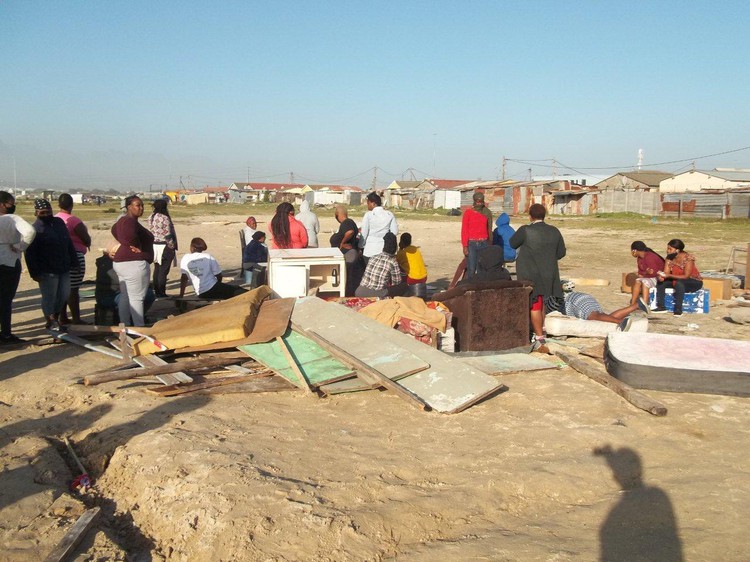Cape Town councillors and activists trade accusations over land occupations
20,000 shacks have been built since January but City says it only has money to build 2,000 houses
More than 200 land occupations were reported in Cape Town from July to September this year. Archive photo: Vincent Lali
More than 200 land “invasions” were reported in Cape Town from July to September this year, while almost 20,000 structures have been illegally occupied since January, according to the municipality.
Briefing the provincial committee on human settlements on Wednesday, Mayco Member for Human Settlements Malusi Booi said there was a backlog of 300,000 people waiting for housing. But, he said, the money received from national government was insufficient.
In the current financial year, only 1,800 to 2,000 houses would be built, he said.
According to Booi, some of the key trends fuelling land occupations were the economic impact of Covid-19, “political manoeuvring, and “shack farming” which includes selling of state, City and private land.
Hot spot areas for land occupations were Khayelitsha, Mfuleni, Delft, Kraaifontein, Philippi and Dunoon. He said 3,257 houses, which had been budgeted for, had been lost to land occupations.
R490 million had been budgeted for the greater Khayelitsha and Nkanini area would, while R57.2 million had been budgeted for Maroela North in Kraaifontein.
“Those people that have been waiting patiently for housing will no longer get them because we will have to reprioritise and take that budget and give it to another community,” said Booi.
He also mentioned the Empolweni site in Khayelitsha, where residents were evicted during lockdown but granted permission by the court to return to the site, as one of the land occupations that has caused the loss of housing.
Roy Stewart, from the provincial Department of Human Settlements, said the department had an internal unit of property inspectors, who monitored the department’s vacant properties daily “and prevent threats immediately”. “We are working with the department of community safety, active monitoring teams, and we have a collaboration with the City through the anti-land invasion unit, metro police and special investigating unit.”
He said there had been few occupations on the department’s land in the last few weeks. “But even though the number is small, the impact is huge,” said Stewart.
Mayco Member for Safety and Security JP Smith said there was a lack of action on land occupations by the South African Police Service, a lack of prosecution of occupiers, and a lack of understanding of law and process by private property owners and the general public.
Court decisions compelling authorities to provide alternative accommodation “is definitely a major challenge because it means in effect that if you lose any land to a land invasion, you won’t recover it”.
“In July this year we had a massive spike in land invasions on all land, national government’s land, SANParks (South African National Parks). In fact the biggest land that was lost was SANParks land.”
“There are 4,500 structures that have been built that in terms of the court rulings we have not been able to remove because of what the court defines as occupied or completed. So this means, since January, about 20,000 structures have been built. Remember we can’t do evictions without a court order but that has been made more difficult,” said Smith.
Smith also accused housing organisations of being responsible for land occupations saying, “The instigators of these actions [land occupations] are well known to us and documented. We are building files on them because we see them at every land invasion, we see their social media utterances. They are linked to organisations like Ndifuna Ukwazi, Social Justice Coalition, Reclaim the City and others. They are funded by international funding organisations whose South African representatives are known and former and current political figures who channel that funding. We know what’s going on here; it’s not a mystery.”
In response to the accusation, Karen Hendricks from housing movement Reclaim the City said: “The City and the Province have always been blaming the poor and working class for their failure to address the housing crisis or to make land available.”
“Both the City and Province have always prioritised the needs of a few, that would be the wealthy. The City is always looking for some way out for their non service delivery and the easiest way to do that is to call us land grabbers.”
“The City needs an inclusive housing policy. In the absence of that policy, once again the poor and working class are left out and have no access to housing in well located areas,” said Hendricks.
Support independent journalism
Donate using Payfast

Don't miss out on the latest news
We respect your privacy, and promise we won't spam you.
Next: “Scandal-ridden” Lottery board chairman to leave in November
Previous: Covid-19: “We are starving” says singer Vicky Sampson
© 2020 GroundUp. This article is licensed under a Creative Commons Attribution-NoDerivatives 4.0 International License.
You may republish this article, so long as you credit the authors and GroundUp, and do not change the text. Please include a link back to the original article.

